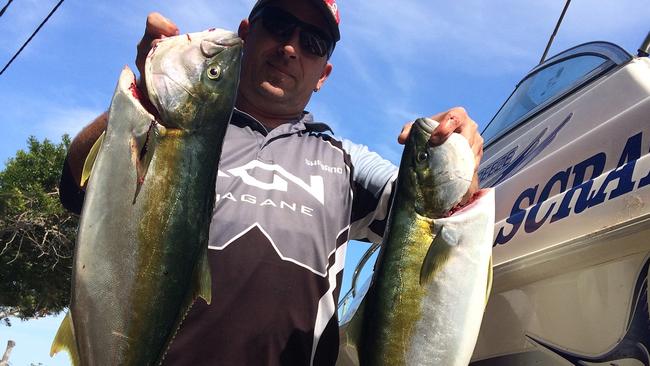Anglers’ dream as 20,000 farmed kingfish escape
NSW anglers are in heaven as 20,000 farmed kingfish escape.

The escape of 20,000 farmed kingfish near Port Stephens is creating a “bonanza” for local fishermen — with tales of tonnes being caught without hooks — but also fears for the marine ecology.
The yellowtail kingfish escaped from so-called Fortress Pen at a fish-farming research project jointly run by the NSW government and Huon Aquaculture on January 18, and “shoals” of the voracious eaters are still being caught by local fishermen.
“The locals are having a bonanza,” Port Stephens tourism operator Frank Future told The Australian. “One of my crew was out spearfishing with his buddies at Broughton Island when a massive shoal of these kingfish came sailing through. They shot 60 of them, so they took their bag limit in the matter of an hour. Another commercial fisherman here told me he’d taken six tonne … you don’t even have to use a hook.”
However, Mr Future — also chairman of the local marine parks association and estuary management committee member — said the escape, which occurred in wild weather, was “not a good look” for an area hoping to win World Heritage listing.
He was particularly concerned that the kingfish, although fed on pellets, might retain wild instincts and impact on smaller wild fish.
“These animals, even though they’ve been fed on pellets since birth, are going to have some genetic memory and going to be looking to eat anything. I am concerned,” Mr Future said.
The NSW Department of Primary Industries downplayed the impact. “DPI doesn’t believe that the number of fish remaining at large is significant in terms of the total wild yellowtail kingfish population in the area,” a spokesman said.
Huon Aquaculture, a Tasmanian company focused on salmon farming, said more than 3000 kingfish had been recaptured. A spokeswoman denied the escape was a worrying sign for the company’s plans to expand salmon farming in Tasmania’s Storm Bay using the same kind of pen, which Huon has lauded as superior to others used in the industry.
The company revealed the great kingfish escape may have been caused by the humble barnacle. “Preliminary findings of the incident investigation indicate the nets detached from the sea pens as a result of barnacles cutting through ropes,” she said.
The type of barnacles involved was not found at the company’s Tasmanian salmon operations. “This experience is a clear example of why we undertake trials and research at a small scale before commercial operations begin,” she said. “Taking immediate effect, we will increase our sea pen inspections and augment them with the use of underwater remote-operated vehicles with cameras attached, to make sure we know when there are barnacles present and can clean them off as quickly as possible.
“The farmed fish are from locally sourced, wild parent stock and are health checked regularly, so we don’t believe they present any kind of biosecurity risk … We don’t believe they will have a significant impact on wild fish populations in the area.”



